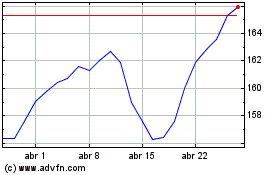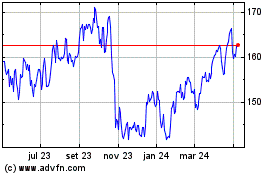California Refiner Margin Penalty Will 'Only Exacerbate' Volatility, Chevron Says -- OPIS
14 Dezembro 2023 - 3:56PM
Dow Jones News
Chevron didn't mince words in criticizing what it called
California's "adversarial business climate" when it issued a
statement this week opposing the state's proposed refiner profit
margin penalty.
"California's policies have made Chevron's investments in its
home state riskier than investing in other states, with projects
being lower in quality and higher in cost," Andy Walz, president of
products at Chevron said in public comments posted to the
California Energy Commission's website.
"Chevron alone has reduced spending in California by hundreds of
millions of dollars since 2022 ... California's policies have made
it a difficult place to invest so we have rejected capital projects
in the state. Such capital flight reflects the state's inadequate
returns and adversarial business climate."
The company called on the CEC to "articulate a theory" on how a
profit margin penalty will solve challenges facing the state's fuel
market and suggested such a move will decrease investment in
gasoline as well as in renewable energy projects.
Walz also cited "permitting challenges" Chevron has faced over
the last year that led to the company canceling "several
projects."
"The price spikes and market volatility symptomatic of tight
gasoline supply will only get worse (and) this disincentive to
California manufacturing will make them more frequent and more
disruptive," Walz wrote.
The CEC held a workshop on Nov. 28 to discuss the refining
margin and possible penalty in which one presenter said the state's
refiners "may be exercising market power."
"California has consistently brought in less crude than it has
the ability to refine and that's an indication of an industry that
could be exercising market power or at least has some inefficiency
in it," said Matthew Zaragoza-Watkins, an economics professor at
Vanderbilt University, adding that more data collection is
necessary.
He suggested there is a way to structure a profit margin penalty
that keeps the industry "attractive to be in (profit wise) but not
one that's inherently inequitable."
During a roundtable session at the workshop, Western States
Petroleum Association President Catherine Reheis-Boyd said there
are no consumer benefits to a refiner profit margin, "only costs"
that may lead to decreased production or refiners leaving the state
altogether.
Reduction in gasoline supply is the goal, one participant in the
discussion said.
"Gasoline supply should go down in the state, demand has
decreased 20% in the last five years and at the end of the day we
need to transition entirely away from the fossil fuel system to
support our climate goals, which includes transitioning entirely
away from refineries," said Elena Kriger, director of research at
Physicians, Scientists and Engineers for Healthy Energy.
"It'unrealistic to think that all of California's refineries will
or should stay open."
A workshop that had been scheduled for Thursday has been
canceled and will be rescheduled, the CEC said.
This content was created by Oil Price Information Service, which
is operated by Dow Jones & Co. OPIS is run independently from
Dow Jones Newswires and The Wall Street Journal.
--Reporting by Bayan Raji, braji@opisnet.com; Editing by Jeff
Barber, jbarber@opisnet.com
(END) Dow Jones Newswires
December 14, 2023 13:41 ET (18:41 GMT)
Copyright (c) 2023 Dow Jones & Company, Inc.
Chevron (NYSE:CVX)
Gráfico Histórico do Ativo
De Mar 2024 até Abr 2024

Chevron (NYSE:CVX)
Gráfico Histórico do Ativo
De Abr 2023 até Abr 2024
